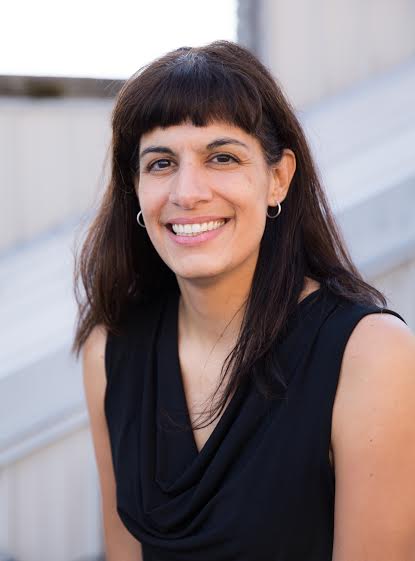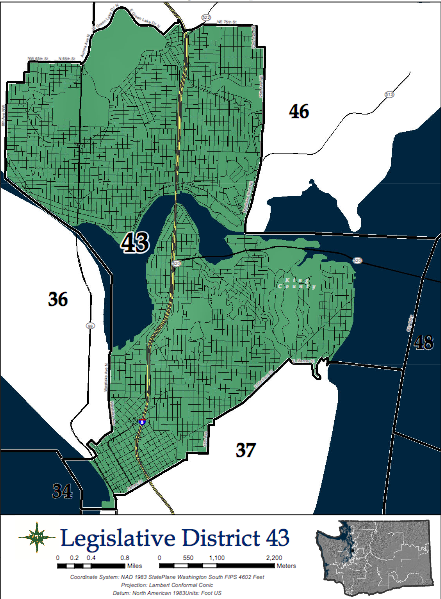
Earlier this month, staff from The Urbanist met with candidates seeking election in the open seats of the 43rd Legislative District and 7th Congressional District for interviews. We also surveyed them on urban issues ranging from support of local initiatives like the Seattle Housing Levy and Sound Transit 3 to solutions on affordable housing and policies to address climate change.
Over the next week or so, we’ll be releasing our surveys from candidates in the 43rd Legislative District (Representative Position 1) followed by candidates in the 7th Congressional District. In early July, our Elections Board will release Primary endorsements of The Urbanist covering both candidates and local issues.
The following is our full survey from Nicole Macri, candidate for the 43rd Legislative District.

Do you consider yourself an urbanist? Why/Why not?
Yes. The 43rd District is the most densely populated district in the state, and is facing the most rapid population growth in Washington. My partner Deb and I have lived on Capitol Hill for the past 11 years (and in Seattle for the last 17 years), and we see the resulting changes in our city on almost a daily basis. New residents are moving here for the high quality of life many enjoy, while at the same time, more and more people are being pushed to the margins. We need to implement thoughtful local and state policies that help create and sustain a diverse, thriving city. This includes increasing equitable and sustainable housing density; expanding and better integrating our transit infrastructure; addressing major social problems such as homelessness and addiction; improving urban schools; protecting the rights of a diverse population; and reducing carbon and protecting the environment.
As Deputy Director at DESC (Downtown Emergency Service Center), I have spearheaded the creation of Housing First affordable housing buildings for extremely low income people in many areas of the city. These specialized, multifamily apartment buildings provide homeless people with low-barrier access to stable housing and voluntary in-house services with a focus on mental health and addiction services. The Housing First model significantly lessens the financial burden to the city and the state for services like mental health care, police protection and emergency shelter. I subscribe to urbanist ideals because I have seen how a housing deficit and skyrocketing rents can have devastating effects on low- and middle-income families and individuals. Increasing housing density, investing in or requiring affordability in housing, and implementing a safe and equitable transportation system will help mitigate some of the effects of our current affordability crisis.
What is your strategy for making housing more affordable both for very low-income and middle-class workers?
I am a strong proponent for prioritizing funding the Housing Trust Fund to address the growing need for affordable housing in our state, and will work on a long-term strategy to ensure stable allocations to the Fund. The state is the single largest landowner within the city of Seattle, and we should explore how we can use some of these sites for affordable housing. I will seek the recommendations of the relevant officials, including the the Commissioner of Public Lands, to come up with thoughtful housing development proposals.
I support the elimination of the statewide ban on local policy-setting regarding rent stabilization. Local jurisdictions should be able to devise policies that work best for their residents. I support incorporating strong housing affordability requirements in transit-oriented projects, such as those that were included in the legislation for Sound Transit 3. We should look for opportunities for the state to incentivize or require affordable housing as a part of any investments or authority granted to local communities. I support lifting the sunset on real estate document recording fees that fund vital housing and services to address homelessness. The current legislation sunsets the fees in 2019, and would displace thousands of people back into homelessness.
What are your preferred policies for adapting to and mitigating climate change?
I will promote legislation that demands carbon reductions and invests in renewable energy. It is imperative our state raises revenue to accomplish this, including from polluting businesses, to make the investments necessary to transition from a fossil fuel economy to a renewable energy economy. I strongly support a tax on carbon.
Climate change poses one of the most severe threats to social, economic and racial equity in Washington, nationally and around the world. I am all too familiar with the inequities around public health (and housing and other human services) as it relates to low income communities and communities of color. I see up close the direct and disproportionate negative impacts they have on people’s lives as I advocate daily for some of the most disenfranchised people in our state.
It is essential to raise revenue to make sure communities who are most impacted by the negative consequences of climate change receive the resources they need and create a just transition for workers who earn their livings in the fossil fuel economy. I am committed to being a leader on tax code reform and expanding our state’s sources of revenue.
Increasing the supply and integrating affordable housing and transportation are also essential to reducing carbon emissions and protecting our environment. I support the expansion of accessible and affordable housing and transportation options, and the strategic co-location and integration of housing and transportation (including transit, bike infrastructure, sidewalks, and road maintenance).
What are your preferred policies for ending homelessness?
I strongly support Housing First approaches, and believe we must bring these to scale across the state. I helped pioneer the Housing First approach, offering people a place to live and surrounding them with the support they need to keep that home, and make it national policy in addressing homelessness. I worked with researchers from University of Washington to demonstrate that providing permanent supportive housing to high needs people can save millions of dollars, while improving the quality of life for all of us. Following this, I have been at the forefront of building a national movement to implement Housing First strategies to end homelessness in communities across North America. I led the planning for two national Housing First Partners conferences which attracted over 700 attendees each to share on-the-ground strategies from practitioners, policy makers and academics in the field. This effort has resulted in innovative strategies being taken to scale in many states. With the right legislators in place, we could see similar results in Washington too.
As President of the Washington Low Income Housing Alliance Board of Directors, I have worked to expand affordable housing across our state and promote policies that protect renters. I have informed numerous legislative bills. I have also championed Seattle’s Housing Levy. I was appointed by City Council to serve successive terms as a member of the Housing Levy Oversight Committee to monitor the progress of the $145 million voter-approved levy in achieving its goals, and currently serve on the steering committee for the 2016 Yes for Homes campaign to renew and expand this levy.
As deputy director of DESC, I hear weekly of stories of clients who are denied housing based on the source of their income or rent payment, including Section 8 and other rent subsidies. In King County alone, upwards of one thousand people have housing subsidies that landlords refuse to accept, leaving them homeless for months after receiving assistance.
I will work to educate my colleagues about how this exacerbates homelessness and harms people who depend on government or nonprofit agency assistance to get or maintain housing. I will be a leader on this legislation. I will be a champion on community-based, harm reduction strategies to address the needs of people living with mental illnesses and substance use disorders. As evidenced by two recent supreme court findings, the state is failing in its obligation to provide adequate mental healthcare, leaving many people at serious risk of long-term homelessness.
What state policies would you support to create more livable urban communities?
We’re facing an affordability crisis in our city and our state that is driving increases in homelessness, and displacing low- and middle-income people to areas far from their jobs, schools and other resources. The housing and transportation priorities I reference above will greatly improve livability for everyone in our city and cities around the state.
What state policies would you support to create more equitable urban communities?
I was glad to be at the kickoff event for Raise Up Washington I-1433, and will continue to support and advocate for raising the minimum wage and passing this important initiative. I oppose tip penalties, training wages and total compensation proposals. The state should not preempt local governments from setting higher wages than the state and I would oppose any such efforts in the legislature. In addition to the housing investments and protections I name above, I support stronger Fair Housing enforcement to protect renters and homebuyers from discrimination, and will call on the state to support these efforts. The state must meet its constitutional obligation to fully fund public education. Seattle demonstrates the greatest white-black achievement gap in the state. I support progressive reforms to our state tax code to generate the revenue necessary to fund public schools, including state colleges and universities.
How can the state transportation budget better support diverse transportation choices?
In Washington, local governments pay the bulk of transit operating costs using sales taxes, a funding source that is both regressive and unreliable. I will work to enable local governments to raise funds for transit. I will rely on and work with experts to help determine what alternate funding sources are available—specifically an option that is a less volatile source than sales tax revenue. We should work to increase the portion of the gas tax that is allotted for transit funding. Should there be a ballot initiative to cut funding for public transit options, I will do everything in my power to ensure that critical transportation systems are not affected.
Would you support a repeal of the state ban on rent control? Why/Why not?
Yes. We are facing an affordability crisis that demands an urgent response. While increasing the supply of housing will help to address this challenge, it will not do it quickly enough to prevent displacement of thousands of low- and middle-income household. Local jurisdictions should be able to devise policies that work best for their residents.
Do you support a mileage-based fee on vehicles to replace the gas tax?
Yes
Do you support mandatory inclusionary zoning?
Yes
Do you plan to support Sound Transit 3?
Yes
Do you support the Seattle Housing Levy?
Yes
Do you support the preservation tax exemption as applied to both non-profit and private landlords?
Yes

Elections Committee
The Urbanist was founded in 2014 to examine and influence urban policies. We believe cities provide unique opportunities for addressing many of the most challenging social, environmental, and economic problems. We serve as a resource for promoting urbanism, increasing political participation, and improving the places we live. The Elections Committee consists of community volunteers and staff members of The Urbanist and is a standing body representing the political values of our organization.

